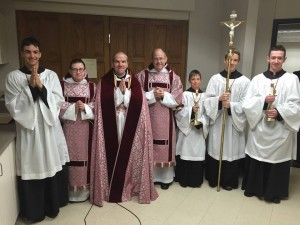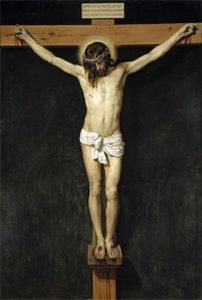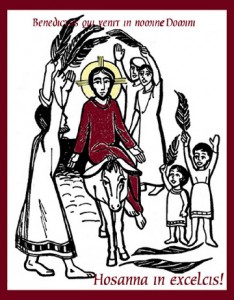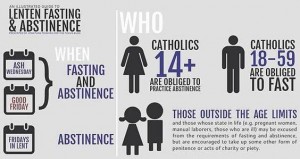Joseph Shaw published this reflection on the lectionary “How not to deal with offensive liturgical texts” over at the blog, LMS Chairman. You may find the article interesting and helpful.
Holy Week Schedule 2016
LÆTARE SUNDAY 2016
 Benedictine monk and priest Father Bede Price preached this sermon today for Lætare Sunday. Father Bede is a member of Saint Louis Abbey and Rector of the Oratory of Ss. Gregory and Augustine (on the campus of St Louis Abbey).
Benedictine monk and priest Father Bede Price preached this sermon today for Lætare Sunday. Father Bede is a member of Saint Louis Abbey and Rector of the Oratory of Ss. Gregory and Augustine (on the campus of St Louis Abbey).
LÆTARE SUNDAY 2016
The study of how traditions developed surrounding the sacred Liturgy and especially the Church Year is fascinating. Almost all the Sundays of the year have an “Official” designation taken from the first few words of the Introit of the Mass. But many of them, likewise have unofficial nicknames or folk designations based on traditions that surround them. Thus we have “Stir-up Sunday” at the start of Advent, where the collect of the Mass, Excita quæsumus, Domine, reminds housewives they need to get going with their Christmas puddings, or “Plough Sunday” after Epiphany when the holiday time of the Twelve Days of Christmas was over and the agricultural work year had to begin again; and so on. The term “Lent” itself is just a nickname, being an Old English word that simply means “Spring” (The Official name of Lent is Quadragesima, which just means “The 40 Days”.
Thus this Sunday in Lent is traditionally and officially known as “Laetare” Sunday from the opening words of the Mass Lætare Jerusalem — “Rejoice, O Jerusalem”. Its festivities mark the halfway point during the season of Lent and so in many places its called “Mid-Lent Sunday.” Strictly speaking, the Thursday before Lætare Sunday is the middle day of Lent, and at one time it was observed as such. Later, the special signs of joy permitted on this day, intended to encourage the faithful in their course through the season of penance, were transferred to the Sunday following. These consist (like those of Gaudete Sunday in Advent, which came much later and really just imitate Lætare) of the use of flowers on the altar, of the use of the organ at High Mass and Vespers; and perhaps most famously (or infamously), rose-coloured vestments are allowed instead of the usual penitential purple. The stational Church in Rome today is the church of S. Croce in Gerusalemme, one of the seven chief basilicas and in this context the Introit’s call for Jerusalem to rejoice is all the more obvious.
S. Croce is the basilica built in the fourth century by the Emperor Constantine. The Emperor’s holy mother, St Helena, enriched it with the most precious relics of the Passion, and wished to make it the Jerusalem of Rome. She even had shiploads of earth from Mount Calvary brought to Rome to be put down on the site of the basilica. Here pilgrims could venerate the relics of the Passion especially the inscription which Pontius Pilate ordered to be fastened to the Lord’s Cross. The name of Jerusalem, which has been given to this Basilica, calls to mind the heavenly Jerusalem, the Church, which is the subject of the Epistle for this Mass: “The Jerusalem above is free, and she is our mother.” Up to the 14th century, when Avignon became for a time the city of the Popes, the ceremony of the Golden Rose took place in this Church.
The Blessing of the Golden Rose is one of the ceremonies peculiar to the Papal Liturgy for the Fourth Sunday of Lent, which gives this Sunday another one of its nick names: Rose Sunday. We find it observed under the pontificate of St Leo IX (11th century); and we have a sermon on the golden rose preached by the Pope Innocent III (1198-1216)—on this Sunday. In the middle ages, when the Pope resided in the Lateran palace, having first blessed the rose, he rode on a donkey to S. Croce accompanied by all the Cardinals, the clergy and the faithful, where he again blessed the golden rose which remained on the altar through the Mass and was later sent it as a special gift to whomever he wished to honor.
The English-speaking world has given many other quaint names to this Sunday: it is sometimes called “Refreshment Sunday”, or the “Sunday of the Five Loaves” (from the miracle recorded in the Gospel); in England it is called “Mothering Sunday”, an allusion to the Epistle, but also because formerly the faithful used to pay their tithes in the cathedral or mother-church of the diocese on this day. Servant girls (like poor Hagar) were given the day off to go to visit their families and took little fruit cakes called Simnel Cakes to their mothers. Not surprisingly in some places today is called “Simnel Sunday”. Over time this custom translated into the secular holiday that we celebrate in May as “Mothers’ Day”.
In the end, Shakespeare got it right, “A rose by any other name would smell as sweet.” Whatever name we give it, the connection between this Sunday and the approaching season of Passiontide is worth noting. As Christians, we know the rest of the story, and therefore as we now turn our attention to the contemplation of the suffering and agony of Our Lord, we can truly rejoice in the mystery of the Cross, which of course St Paul tells us is our boast and in which we glory and through which we are saved and delivered. Therefore on this Sunday, as we now prepare to redouble our efforts at penitence, we cast Lent aside in our joy at the approaching Feast of Easter at least for one day. Moreover, we are not just permitted to enjoy those little things we gave up at Ash Wednesday, we are actually ordered to do so: Lætare Jerusalem, gaudete cum lætitia, exultetis et satiemini.
Lenten Indulgence – Prayer Before a Crucifix
 Fridays of Lent offer the faithful the possibility to receive a plenary indulgence, if they recite the prayer before a crucifix (the indulgence is a partial indulgence any other time).
Fridays of Lent offer the faithful the possibility to receive a plenary indulgence, if they recite the prayer before a crucifix (the indulgence is a partial indulgence any other time).
Also, on any of the Fridays of Lent, one can devoutly recite after Communion the prayer “En ego, O bone et dulcissime Iesus” before a crucifix. From the context, it is imperative to do so after receiving Communion, during thanksgiving, to receive the plenary indulgence.
Prayer Before a Crucifix
EN EGO, O bone et dulcissime Iesu, ante conspectum tuum genibus me provolvo, ac maximo animi ardore te oro atque obtestor, ut meum in cor vividos fidei, spei et caritatis sensus, atque veram peccatorum meorum paenitentiam, eaque emendandi firmissimam voluntatem velis imprimere; dum magno animi affectu et dolore tua quinque vulnera mecum ipse considero ac mente contemplor, illud prae oculis habens, quod iam in ore ponebat tuo David propheta de te, O bone Iesu: Foderunt manus meas et pedes meos: dinumeraverunt omnia ossa mea. Amen.
BEHOLD, O good and most sweet Jesus, I fall upon my knees before Thee, and with most fervent desire beg and beseech Thee that Thou wouldst impress upon my heart a lively sense of faith, hope and charity, true repentance for my sins, and a firm resolve to make amends. And with deep affection and grief, I reflect upon Thy five wounds, having before my eyes that which Thy prophet David spoke about Thee, O good Jesus: “They have pierced my hands and feet, they have counted all my bones.” Amen.


